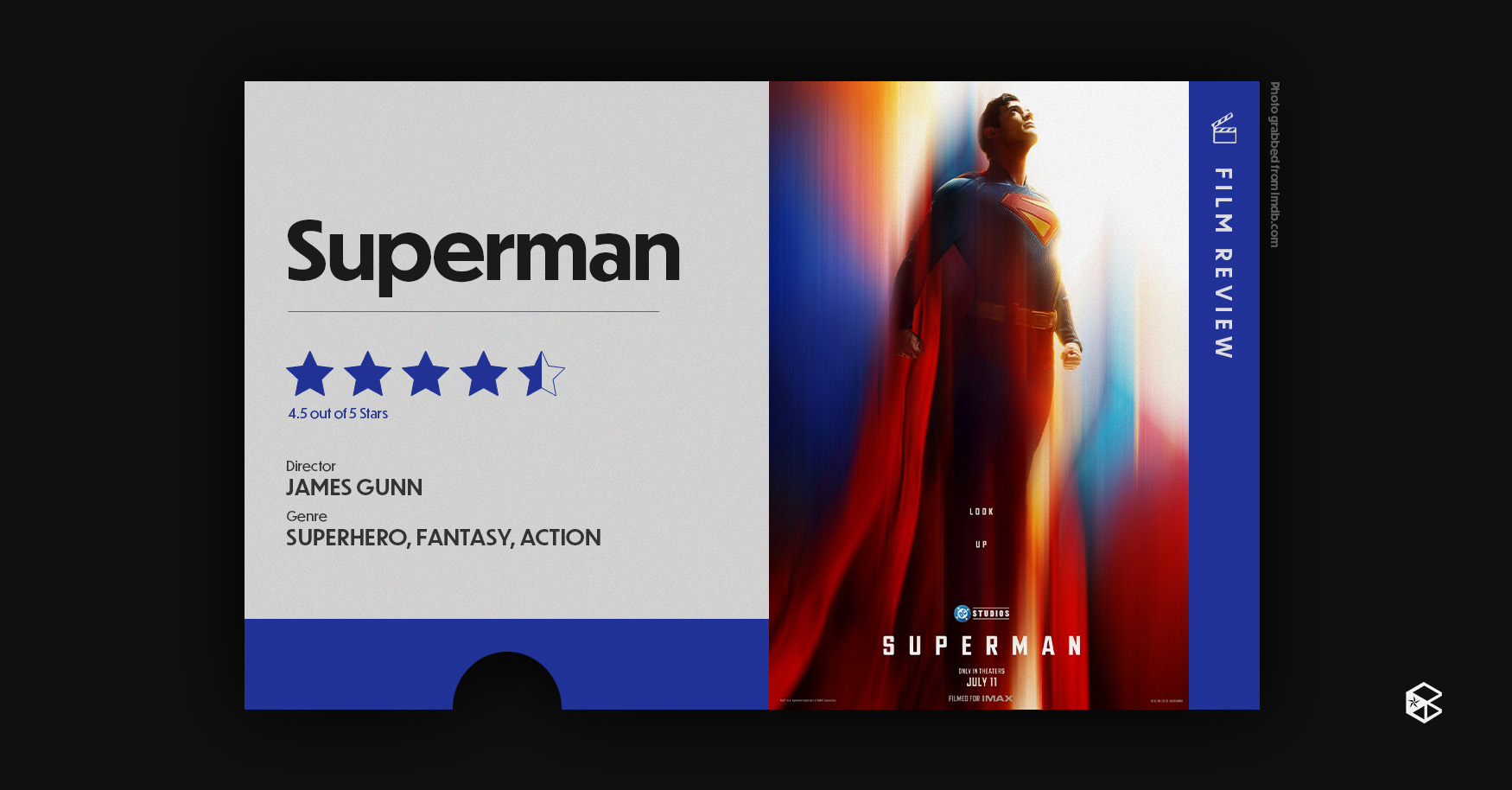Superman (2025) intertwines themes of hope, heroism, and moral clarity against the vibrant backdrop of Metropolis. Directed by James Gunn (Guardians of the Galaxy Vol. 1 to 3, and The Suicide Squad) and produced by DC Studios, the film explores the emotional depths of its characters while navigating the complexities of modern heroism.
The film follows Superman (David Corenswet), a hero determined to prove his genuine desire to protect humanity, and Lois Lane (Rachel Brosnahan), a journalist uncovering the truth behind the growing public suspicion. Their story intersects with the calculating Lex Luthor (Nicholas Hoult), whose efforts to manipulate media and public opinion threaten to unravel Superman’s mission. As Superman faces widespread doubt about his intentions, he must maintain his moral center while discovering that his greatest power lies not in his abilities, but in his unwavering belief in humanity's capacity for hope.
He has arrived
Gunn's approach to Superman represents a radical departure from the prevailing superhero film paradigm that has dominated the genre for over a decade. While most modern superhero films have embraced moral ambiguity, deconstructed heroism and explored psychological toll of power, Gunn's vision deliberately returns to the foundational elements that made Superman an enduring cultural icon.
The franchise reboot reimagines what a superhero universe can be by rejecting the notion that maturity requires darkness or that complexity necessitates moral compromise. This creative vision represents a fundamental challenge to the superhero genre's evolution over the decades. Where films like The Dark Knight trilogy, Logan, and even the MCU's later phases have explored themes of corruption, sacrifice, and the cost of heroism, Gunn's Superman argues that these explorations, while valid, have overshadowed the genre's capacity for pure inspiration.
Perhaps most significantly, Gunn's creative vision establishes a new template for how superhero franchises can differentiate themselves in an oversaturated market. Rather than competing through escalating stakes, darker themes, or more complex mythology, Superman differentiates itself through emotional authenticity and moral clarity. This approach suggests that the most radical thing a superhero film can do in 2025 is not to deconstruct heroism but to reconstruct it, not to question whether heroes can exist but to demonstrate why they must.
Under the lens
Superman centers on a narrative that feels both timeless and urgently contemporary: a hero must prove to a skeptical world that he genuinely wants to protect them. The central conflict with Lex Luthor goes beyond simple good versus evil, instead exploring how public perception and media manipulation can turn even the most benevolent figures into objects of suspicion and fear.
This storyline resonates powerfully in an era where trust in institutions and public figures has eroded, making Superman's struggle to maintain his moral center while facing widespread doubt particularly relevant. Its structure deliberately mirrors real-world tensions about tradition versus progress, asking whether timeless values can survive in a rapidly changing world.
The film's visual language reinforces these themes through deliberate technical choices that distinguish it from previous Superman adaptations by creating a visual aesthetic that contrasts sharply with the desaturated, gritty realism of previous DC films. The color grading has been specifically designed to embrace vivid, warm hues. This approach serves the narrative by creating a visual representation of hope and optimism that supports the film's thematic content rather than undermining it through dark, cynical imagery.
The technical execution supports these themes through every frame, from the warm color palette that rejects modern superhero cinema's tendency toward desaturation to the lens choices that create a sense of intimacy even in epic moments.
However, some of them suggest that while Superman is a fun and vibrant start to the DC Universe, it isn't a great one, indicating that the film's commitment to optimism may come at the cost of dramatic complexity.
Not all heroes wear capes
Superman's embodiment of hope in Gunn's 2025 film arrives at a particularly crucial moment in global consciousness, when divisiveness seems to dominate public discourse. The character's unwavering belief in humanity's potential for goodness serves as a deliberate counterpoint to the prevailing cultural narrative that views idealism as naive or outdated. In a world grappling with many societal issues, Superman's message that individuals can make a difference through kindness and selflessness offers a form of emotional healing that pure escapism cannot provide.
The real-world relevance of Superman's hope becomes even more apparent when considering how the character operates within his fictional world. Rather than solving problems through violence or domination, this Superman represents the power of leading by example and inspiring others to be better versions of themselves.
The film's timing also speaks to a broader cultural hunger for positive role models, particularly in leadership positions. In an era when public figures are often defined by their flaws and failures, Superman represents an idealized version of what leadership could look like—someone who uses their power to lift others rather than tear them down. The character's immigrant background adds another layer of contemporary relevance.
Superman's hope is not passive or naive—it's an active choice to believe in possibility despite evidence to the contrary. This distinction is crucial because it acknowledges the reality of suffering and injustice while refusing to accept them as permanent conditions. The character's hope becomes a form of resistance against despair, cynicism, and the tendency to view problems as too large or complex to solve. In this way, Superman serves as both a symbol of what we could become and a reminder of what we already have the capacity to be.
Through its vibrant visuals and emotionally resonant storytelling, Superman invites audiences to imagine a world where kindness, conviction, and the willingness to lead by example are not just possible but vital. Whether one yearns for the complexity of recent superhero fare or is ready to embrace a return to radiant ideals, Superman reminds us that sometimes, the bravest thing a hero—or any of us—can do is simply refuse to give up on hope.
Fly above the darkness with Superman, now showing in all your local cinemas.


